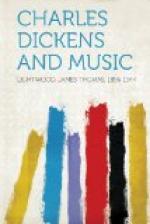The flute of the youngest gentleman was wild and fitful. It came and went in gusts, like the wind. For a long time together he seemed to have left off, and when it was quite settled by Mrs. Todgers and the young ladies that, overcome by his feelings, he had retired in tears, he unexpectedly turned up again at the very top of the tune, gasping for breath. He was a tremendous performer. There was no knowing where to have him; and exactly when you thought he was doing nothing at all, then was he doing the very thing that ought to astonish you most.
Yet another performer is the domestic young gentleman (C.P.) who holds skeins of silk for the ladies to wind, and who then
brings down his flute in compliance
with a request
from the youngest Miss Gray,
and plays divers tunes
out of a very small book till
supper-time.
When Nancy went to the prison to look for Oliver Twist, she found nobody in durance vile except a man who had been taken up for playing the flute, and who was bewailing the loss of the same, which had been confiscated for the use of the county.
The gentleman who played the violoncello at Mrs. Gattleton’s party has already been referred to, and it only remains to mention Mr. Evans, who ‘had such lovely whiskers’ and who played the flute on the same occasion, to bring the list of players to an end.
Hummers
We meet with a remarkable musician in Dombey and Son in the person of Harriet Carker’s visitor, a scientific one, according to the description:
A certain skilful action of his fingers as he hummed some bars, and beat time on the seat beside him, seemed to denote the musician; and the extraordinary satisfaction he derived from humming something very slow and long, which had no recognizable tune, seemed to denote that he was a scientific one.
A less capable performer was Sampson Brass, who hummed
in a voice that was anything but musical certain vocal snatches which appeared to have reference to the union between Church and State, inasmuch as they were compounded of the Evening Hymn and ‘God Save the King.’
Musicians of various degrees abound in the Sketches. Here is Mr. Wisbottle, whistling ‘The Light Guitar’ at five o’clock in the morning, to the intense disgust of Mr. John Evenson, a fellow boarder at Mrs. Tibbs’. Subsequently he came down to breakfast in blue slippers and a shawl dressing-gown, whistling ‘Di piacer.’ Mr. Evenson can no longer control his feelings, and threatens to start the triangle if his enemy will not stop his early matutinal music. A suggested name for this whistler is the ‘humming-top,’ from his habit of describing semi-circles on the piano stool, and ‘humming most melodiously.’ There are a number of characters who indulge in the humming habit either to cover their confusion, or as a sign of light-heartedness and contentment.




